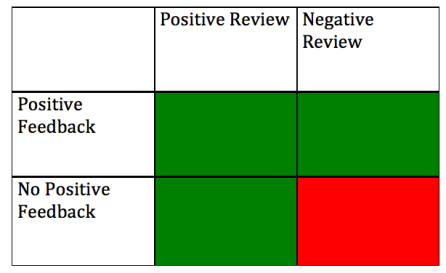I’ve been thinking a lot about reviews lately. For a writer, reviews are extremely powerful things.
Get a great review from the right person and your confidence will soar and the readers will come flooding in.
Get a negative review from the wrong person and your ego will collapse and you may decide to never write another story ever again.
Notice how I said from the wrong person.
Getting a negative review is no bad thing; in fact it is something that I heartily encourage you to seek out. Sooner or later, no matter how good you are, someone will have something bad to say about your work – the longer it takes for you to reach the moment, the harder you will end up falling.
There will be some of you who may already have quite a hardened shell when it comes to negativity. Whether it is articles you have submitted to magazines, or hunting down a literary agent, you would have doubtlessly received one of those standardised rejection letters and felt that familiar pang of anxiety and sadness upon its arrival. A friend of mine maintains that he has received so many rejection letters in his time that he could quite happily redecorate his house with them, and yet he is a successful writer himself.
As for me, I have received enough rejections in my time to treat my work a fair amount of distance. Even when I sent in my entry to the Fated Paradox competition, I did so with no expectations of winning. That mind-set made it all the better when it started gaining great reviews.
I talked about responding to negative reviews a few posts back. Shortly after posting that blog, I found out that my story had won the competition and, barely twenty-four hours after the official announcement, I had received a fairly negative review of my winning story.
The irony was not lost on me.
But, having learnt to deal with negative feedback to enough of an extent to write a blog post about it, I set about employing my own rules:
- Take time and distance before replying.
- Even negative reviews deserve thanks.
- Don’t assume your reviewer is stupid.
- Make them feel like they have made a difference.
It was during the careful construction of this response that a thought occurred to me.
What do you do if you receive a negative review with no constructive feedback at all?
Unfortunately, this does happen and more often than we would like to think. Sometimes you read a review that is so negative that you can’t find anything positive out of the whole thing. Maybe the reader just hated the concept. Maybe they didn’t like you’re writing style. Maybe they hated your main character.
These are all things that readers may have problems with but are, unfortunately, things you can do very little about unless you are willing to completely rip apart your story and start again. If every review you received were like that then I would say fair enough. But if the majority of your reviews were positive (bar the odd negative review) completely dismantling your work for the sake of one reviewer would be a potential insult to all the other readers who liked it.
It is these reviews that you have to be very careful of and I would even go so far as saying that whether or not you want to engage with such review writers is entirely personal to each individual. That is not to say you shouldn’t thank them for taking the time to write a review – all reviewers have spent time commenting on your work so the least you can do is thank them for it. But engaging them with any comment that might elicit some sort of response is something that you have to decide for yourself.
Basically, you have to decide for yourself whether you are dealing with a genuine reviewer, who is just so angry or annoyed that they can’t even put into words what they thought was wrong with your work, or the reviewing equivalent of an internet troll. It is not always easy to spot one of these people. If you are anything like me, a negative review has the potential to leave you very flustered and therefore unable to distinguish between these two types of negative reviewer.
That being said, I have got a useful little diagram that helps me decide whether a review is worth me worrying about and I would like to share it with you today. Whilst this diagram doesn’t necessarily help distinguish between trolls and genuine reviewers, it does help me quickly identify which reviews I can gain something from.
The rules are simple, if it’s green, I can learn something. If it’s red, there’s no point taking it to heart.
Enjoy peeps.


